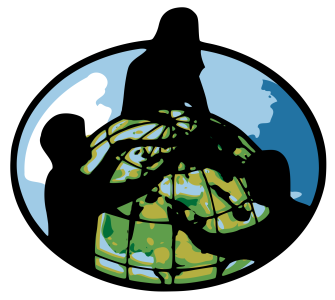I am sitting in a cafe in Italy and all I can think about are my students.
I’ve spent the past month abroad for the first time (!!), traversing through Europe in a camper van with my boyfriend (an adventure unto itself), and so have admittedly been largely removed from teaching, education and, frankly, engaging with the U.S. news cycle. We listen to PBS Newshour nearly every day on our hours-long drives and talk, but I’ve generally stayed away from commenting online or engaging on Twitter. I’ve been claiming it’s because we have limited WiFi (which is true), but in truth, as soon as the plane touched down, I tried to shut down too.
Unfortunately, I am reminded of the ever-present truth that even if we use our privilege to try and hide, the oppressive wheels of our system continue to turn. I wanted to pretend everything was as beautiful and simple as the landscapes in front of me, but when I heard audio of migrant children crying for their families, I felt nauseous. When I read another teenager had been fatally shot by police officers, my chest tightened. When I saw that the U.S. Supreme court had upheld the current administration’s toxic and hateful travel ban, I had to close my eyes and remind myself to breathe (though, Justice Sotomayor’s dissent gave me some life). Even being abroad isn’t a safe haven, as Italy and the EU currently deals with its own migrant crisis that not only shares similarities with ours but affects some of our students.
The problem is, as a teacher, there’s very little I can do about it right now. There are, of course, things we can and should do as citizens, but I am currently thousands of miles away from my now-former students, and even if I weren’t, they’re not going to have my classroom as a space to process and analyze what’s going on. They’ll be in high school, occasionally visiting me when they feel nostalgic.
Yet, they are there in the back of my mind and imprinted on my heart. Not just last year’s students, but all the students I’ve had-- particularly the ones I taught when I lived in Los Angeles, some of whom were undocumented. I know they are in similar situations as the thousands of other current students teachers across the country have. I doubt I am the only one who worries and mourns the fact that they have to process the horrible things happening in our country, and that they might not have a safe space to provide support in that process since school is out.
And that hurts. Feeling helpless hurts. The one thing I can do is prepare to hit the ground running next year. The truth of the matter is I have very little influence on my students over the summer. Yet, our work as educators is as important as ever. I often say that I cannot control what happens to my students outside my room. That’s true, but it’s also true that the work we do with our students is preparing the next generation to face everything outside of it. I can’t be with my students at all times to try and help them walk this world, but of course, no one can. They must learn to walk it themselves.
What I can do is give them the tools and ask them to critically consider the world when they are in my classroom. I will not always be with them when they interact with the news or see injustice around them. What I can hope is that what they learn alongside me will help make the difference between their choice to engage as critically conscious citizens, or to blow it off with a casual joke or hateful word.
What I can do is give them safe spaces and validate their identities in hopes that the strength they gain then will carry them beyond the time they spend with me. I hope they can draw on the strength they gain from each other and with me in order to advocate for themselves and others when they see injustice around them.
What I can do is push my colleagues and my own practice to question and grow our work to prepare students not just to deal with the current realities of the world, but also to take down the systems that have oppressed them for generations.
So, what we can do now is continue to read, think, process and prepare. Yes, that should involve some self-care. We are also human. We should also take the time to spend with our friends and family, let our brains rest, and travel if we can. I am forever changed in ways I can’t yet know by this summer abroad, where I’ve experienced other cultures and values and, for the first time, been in a country in which I do not speak the language. The sense of empathy and openness of perceptions that it has brought (despite the fact that I’ve tried my best to read about it all these years) has already made me eager to do some new things in my classroom. This is important, and just because we rest doesn’t mean we have to shut down in the process (I’ll share some things I’ve been looking at the end of this post). In order to do the work with our kids, we have to take the time we have to do the work within ourselves, too.
It also involves, when we’re ready, a time to dig deep and ask ourselves what kind of world we want to see, and the classrooms we can create to help eventually reach that goal.
Photo via Pixabay

Some Things For the Summer (in no way a comprehensive list, just some things I liked)
- Getting Curious with Jonathon Van Ness - “How to Cut Suicide Rates Among LGBTQ Youth,” “What’s It Like Living in America Undocumented?”, “Why’s the Bail System Such a Hot Mess?” “What do White People Need to Know About Racism?”
- If you’re anything like me, you’ve spent hours binging the new Queer Eye on Netflix (it is seriously so good and also really affirming. I also haven’t seen season 2 yet and I’m dying). Jonathon Van Ness is easily lovable, but his willingness to take on difficult questions and topics in a nuanced way that also has a lot of humor has made this a great summer listen.
- “Secrets Of A Maya Supermom: What Parenting Books Don’t Tell You” from NPR
- This piece is not only fascinating but also makes us question not just American culture, but whose views we value and whose we ignore.
- Teaching Tolerance Webinars and Workshops
- All the webinars are on demand and some of the workshops are online. Definitely excellent!
- “What Grief Looks Like: Documenting The Mementos Left After School Shootings” from NPR
- Powerful. What would this look like to discuss in a classroom? How could we replicate this for the content we teach?
- The Student Guide to Freire’s ‘Pedagogy of the Oppressed’
- Suggested by amazing first-year teacher Mel Katz, I haven’t read this yet, but I’m way excited to do so.
- Teaching Transformed: Achieving Excellence, Fairness, Inclusion, And Harmony
- My boyfriend, who just received his Ph.D. in education, discussed this academic during the many hours we have spent in a van together. It’s also written in part by Dr. Lois Yamauchi, who runs the amazing CREDE project in Hawai’i (and is the parent of two of my former students!).


